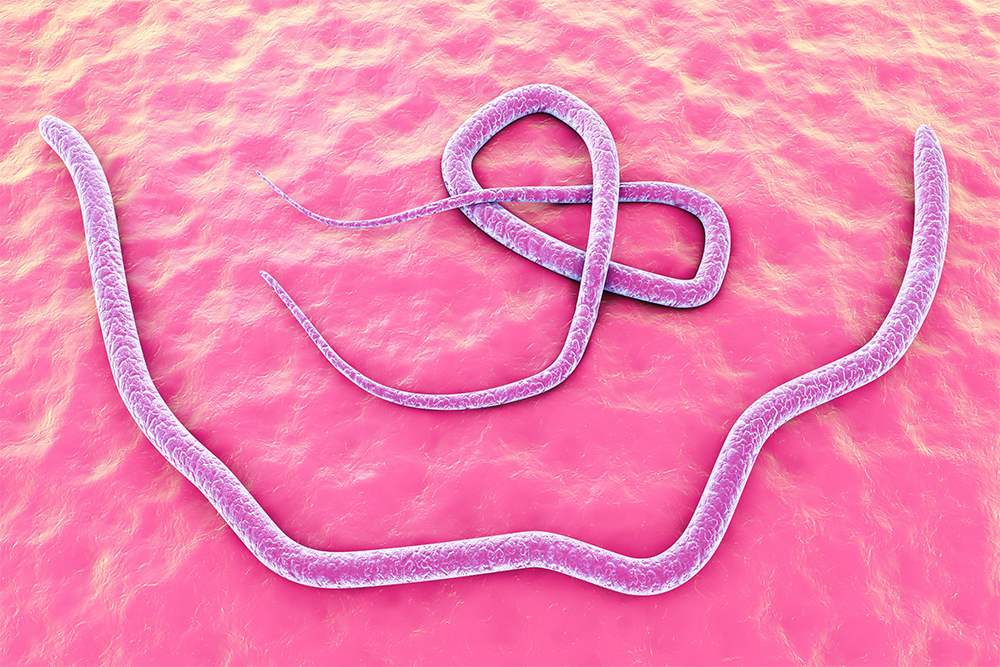Your un-gross guide to parasites (and how to avoid them)

You’re probably all aware that parasites are organisms that live in or on another organism. You’ll have heard of tapeworms, which can be caught from eating raw or undercooked meat that’s contaminated. But there are lots of other types, too.
They include various types of worms (helminths), which range in size from just a few millimetres to several metres, and protozoa, which are microscopic, single-celled parasites. They often live in the gut, but some of the smaller ones can also enter the blood and cause problems in other areas of the body.
If you’re freaked out by the thought of having a parasite, bear in mind that some of them may actually have benefits for your health, similar to many of the bacteria that live in our gut.
However, the ones we’re talking about here are associated with negative effects. These include upsetting the balance of beneficial flora in the gut, causing irritation and damage to the gut lining, and reducing our absorption of nutrients.
If you suspect you have one, it should be treated. Better out than in, as they say!
4 common parasites and how you get them
1. Threadworms
Also known as pinworms, they’re common in children, who often pick them up at school. Despite sounding horrible, and causing an itchy bum, these are relatively easy to discover and treat with over-the-counter prescriptions, which the whole family need to take at the same time.
The best way to prevent them is through a strict hygiene routine – especially regular and thorough hand washing.
2. Tapeworms
This type of flatworm can live in the gut and grow to several metres in size. Tapeworms are the most likely to come to mind – and make us cringe – when we think of parasites.
Commonly picked up from undercooked pork, beef or fish, they can also be caught from food prepared by an infected person who hasn’t washed their hands, and from veg grown in soil contaminated by faeces of infected animals.
3. Giardia lamblia
Very common single-celled parasite, picked up from drinking contaminated water or eating fruit or vegetables that have been washed in it, or swimming in water that’s contaminated.
You’ll probably pick up this little critter in areas where sanitation is poor. Although our immune system can get rid of it without any help, sometimes it can hang around and cause problems.
4. Amoebas
Ranging in size, this parasite is often picked up when travelling further afield. They may have pretty names (such as Dientamoeba fragilis and Entamoeba histolytica), but their effects are nasty!
Short-term symptoms include diarrhoea, stomach pain, vomiting and lack of appetite, but they can lead to inflammation in the bowel (colitis) and can affect the liver over time.
Amoebas can be picked up in the same way as giardia.
Blastocystis hominis
While this is a common, single-celled parasite, it isn’t always considered harmful, so it may not be tested for, or diagnosed by your doctor. This gut bug could be the ‘hidden’ cause of your IBS symptoms, such as bloating, wind, cramps and diarrhoea.
Blastocystis can be transmitted via contaminated food or water, or via contact with an infected person – especially when travelling.
How do you find out if you have a parasite?
With some of the larger parasites, it can be easy to discover that you’re hosting a visitor.
With threadworms, for example, you may see tiny white ‘threads’ in your poo.
But the single-celled parasites, including the others described on the left, are impossible to confirm without a stool test. Your GP can run a basic test; but sometimes it won’t pick up all types of parasites, or you may need multiple tests before an infection is accurately diagnosed.
The best approach can be to work with a nutritional therapist or naturopath – they will have access to more comprehensive gut testing, and can also help you address the parasitic infection, if there is one.
What can you do about them?
If a parasite is discovered by your doctor, you may be given an antibiotic or anti-parasitic medication. This can be the quickest and most efficient way to clear an infection. If you do need medication, take a high-quality probiotic supplement during and especially after the treatment, to help restore your healthy gut flora.
Another way to address parasites is with herbal extracts, which can have surprisingly potent effects. Wormwood, black walnut hulls and cloves are traditional anti-parasitic supplements, and are often used in combination.
If you suspect you have a parasite, you could first of all try a home ‘parasite cleanse’. Look for a supplement or herbal blend containing the herbs above, such as Renew Life’s ‘Paragone’ – a 35-day programme that’s done in two stages.
While you’re doing the cleanse it’s best to eliminate processed and sugary foods and focus on fresh, whole foods, including whole grains, unprocessed meats, fish, eggs, vegetables, beans and pulses, and lower-sugar fruits, like berries.
Eating natural anti-microbial foods, including garlic, could also help, and eating fermented foods, such as sauerkraut, can aid in rebalancing the beneficial flora in your gut.
Is a parasite turning you into a sugar monster?
Parasites and other unfriendly gut bugs (certain yeasts and bacteria) feed off sugar as an energy source, as well as starch and unhealthy fats.
Curb cravings
If sugar cravings are your main symptom, then sort out your diet first, switching to whole foods and cutting as much sugar out as possible, before worrying about a parasite.
Sugar rush?
Eating too many processed foods, refined carbohydrates or sugary foods and drinks can actually cause sugar cravings, by triggering blood sugar swings.
5 signs you could have an unwelcome guest
Parasites can cause many symptoms; here’s what to look out for…
Diarrhoea
Many people pick up a bug on holiday and get over it without any problems.
But if diarrhoea lasts longer than a few days, or comes and goes – especially after a foreign holiday – it’s an indication that your little visitor is sticking around!
Bloating, gas, abdominal pain, indigestion or loss of appetite
Symptoms such as these are often blamed on irritable bowel syndrome (IBS) or other digestive conditions. This can make it very difficult to get a diagnosis, or even to get your doctor to consider a possible parasite infection.
If you develop these symptoms suddenly – again, especially after a holiday – then a parasite could be the cause.
Fatigue and/or anaemia
Parasites may cause deficiencies in iron and B-vitamins, which are needed to build the blood and give us energy.
If you’re experiencing unexplained fatigue, or have been diagnosed as anaemic or iron-deficient without any obvious cause (such as a vegetarian or vegan diet,
heavy periods in women or pregnancy) then a parasite could be at play.
Chronic ‘brain fog’ or poor memory could be another symptom that’s not directly digestion-related. It may be the result of the parasite reducing your absorption of nutrients needed by the brain.
Insatiable and cravings
Although loss of appetite can be a symptom of some infections, excessive hunger or never feeling full after a meal can also be a sign – as can food cravings, especially sugar.
Anxiety, insomnia or teeth grinding
As with brain fog, these symptoms could be caused by toxins produced by parasites. If you experience insomnia that doesn’t have any other cause (stress, noises, exposure to bright light in the evening) then a gut infection could be to blame. Grinding or clenching your teeth in your sleep can also be related to such toxins.
Read more: Does holistic pain relief actually work?












